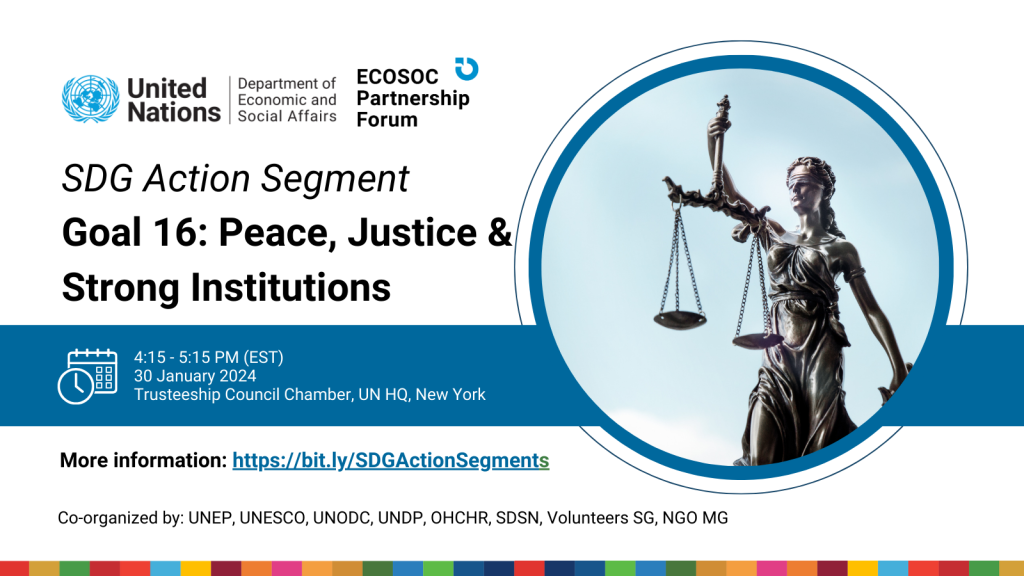Background
Watch recording
Background
The world is witnessing increasing insecurity with conflicts and violence erupting at an intensity that is having devastating effects on both people and the planet. The ongoing climate emergency, growing distrust in public institutions and multilateralism, and the fragility of the global economy are only adding fuel to the fire, intensifying insecurity for so many.
With only six years left in the 2030 Agenda, the Sustainable Development Goals (SDGs) are lagging. A mere 15% of the SDGs are currently on track. Sustainable Development Goal 16 (SDG 16) is showing a particularly negative trend, whereby human rights commitments are not being met, violence is increasing, the nature of conflict is evolving, inequality is hindering inclusive decision making, and corruption is eroding the social contract.
Intentional homicide peaked in 2021. Trafficking in persons appears more hidden than before with an 11% deduction in the detection of victims between 2019-2020. In addition to the devastating personal consequences, the global economic impact of violence was $17.5 trillion in 2022, the equivalent of 12.9 percent of global GDP, or $2,200 per person.
In addition, corruption continues to undermine the delivery of public services and poses serious challenges to environmental governance (and particularly the environmental rule of law), especially in developing countries. It also enables some of the most serious drivers of biodiversity loss, wildlife trafficking and deforestation.
Access to information is also a critical piece of SDG 16. It is critical for enabling citizens to exercise their voice to effectively monitor and hold their governments to account, including in the context of environmental matters. In 1990, only fourteen (14) countries had laws that specifically guaranteed the rights of citizens to access public information. In 2022, according to UNESCO SDG 16.10.2 survey, this number reached one hundred thirty-five (135) laws or regulatory frameworks, in 2023 two more countries adopted such laws. The increase is nearly tenfold, but the need to improve legal frameworks and especially their implementation is more vital than ever. In many cases, activists exercising their legally recognized rights of access to information and related rights to participate in public decision making are subjected to harassment and unlawful arrests. Threats and restrictions to civic space, as well as attacks against human rights defenders, including environmental human rights defenders, is alarmingly high all around the world.
Environmental rule of law, for example, is essential for effective governance. It requires clear, science-informed, and culturally sensitive legal frameworks. Recent trends show integration and decentralization in environmental governance, with positive implications for environmental rule of law.
Despite recent efforts to monitor progress achieved to date, currently, SDG 16 is one of the SDGs with the least amount of data. On average, across all SDG 16 targets, only 40 percent of countries have reported data for at least one year since 2015, limiting the information that could drive evidence-informed policies to accelerate progress towards SDG 16.
In the lead-up to the 2024 High-level Political Forum (HLPF), where SDG 16 is being reviewed, member states and the international community are encouraged to take accelerated action on peace, justice, and inclusion. SDG 16 stands as a cornerstone in this integrated framework, at a time when “structural injustices, inequalities, and emerging human rights challenges are putting peaceful and inclusive societies further out of reach.”
Objectives of the segment
- Galvanize momentum towards the implementation and acceleration of SDG 16 as an enabler across the 2030 Agenda in the lead up to the 2024 High-level Political Forum.
- Set the scene on progress and setbacks on SDG 16
- Demonstrate how concrete action on peace, justice, and inclusion can drive progress across the SDGs and strengthen multilateralism.
- Make recommendations for the Summit of the Future on Peace and Sustainable Development
Organized by
- United Nations Environment Programme (UNEP)
- United Nations Educational, Scientific and Cultural Organization (UNESCO)
- United Nations Office on Drugs and Crime (UNODC)
- Office of the United Nations High Commissioner for Human Rights (OHCHR)
- United Nations Development Programme (UNDP)
- Sustainable Development Solutions Network (SDSN)
- Volunteers Major Group
- Non-Governmental Organizations Major Group
For any additional questions, contact Ms. Priya Sood, UNDP, priya.sood@undp.org
Concept note and programme
Summary
Participation
The SDG Action Segments are open to all in-person attendees of the ECOSOC Partnership Forum. The Segments will be available to follow along virtually on UN Web TV.

Additional Resources
Concept Note
Summaries

